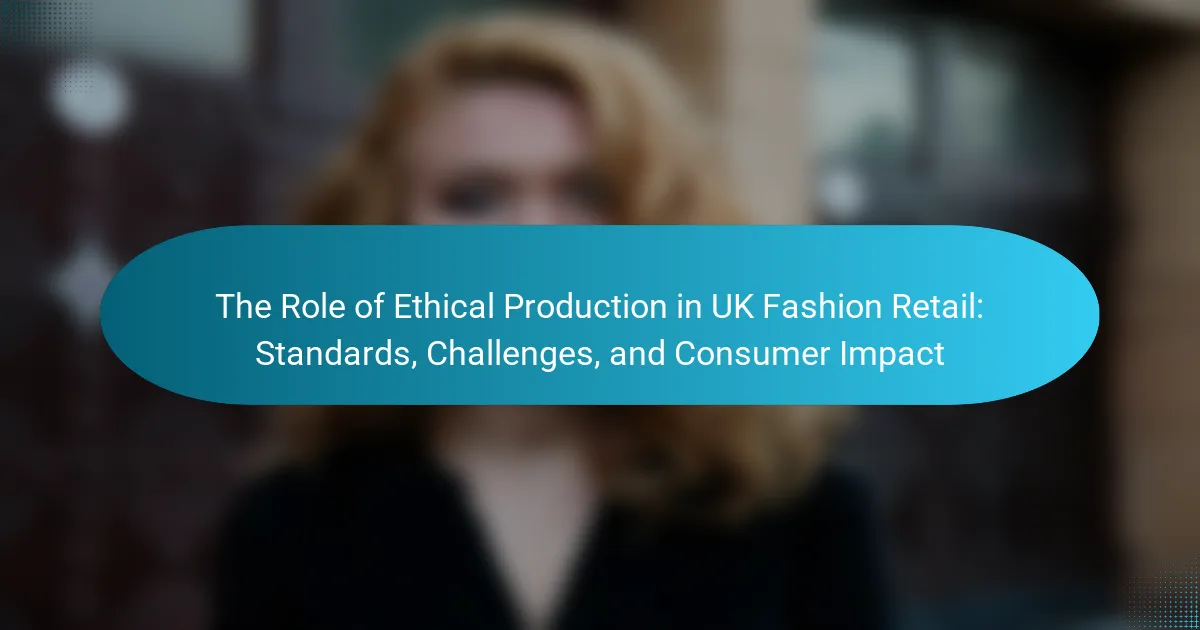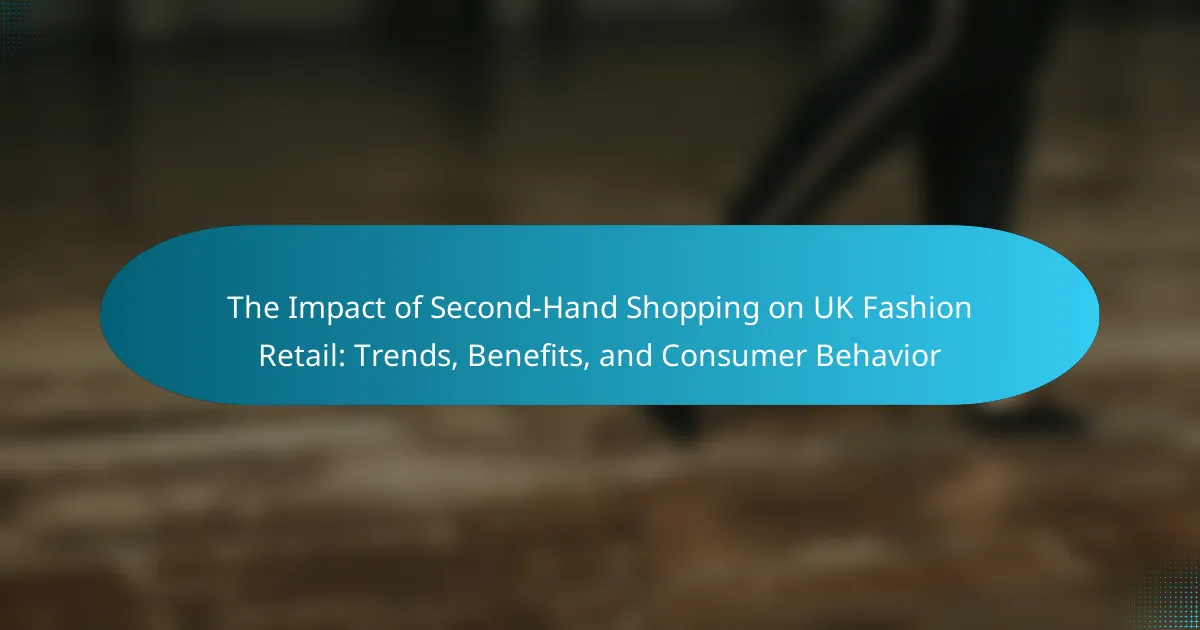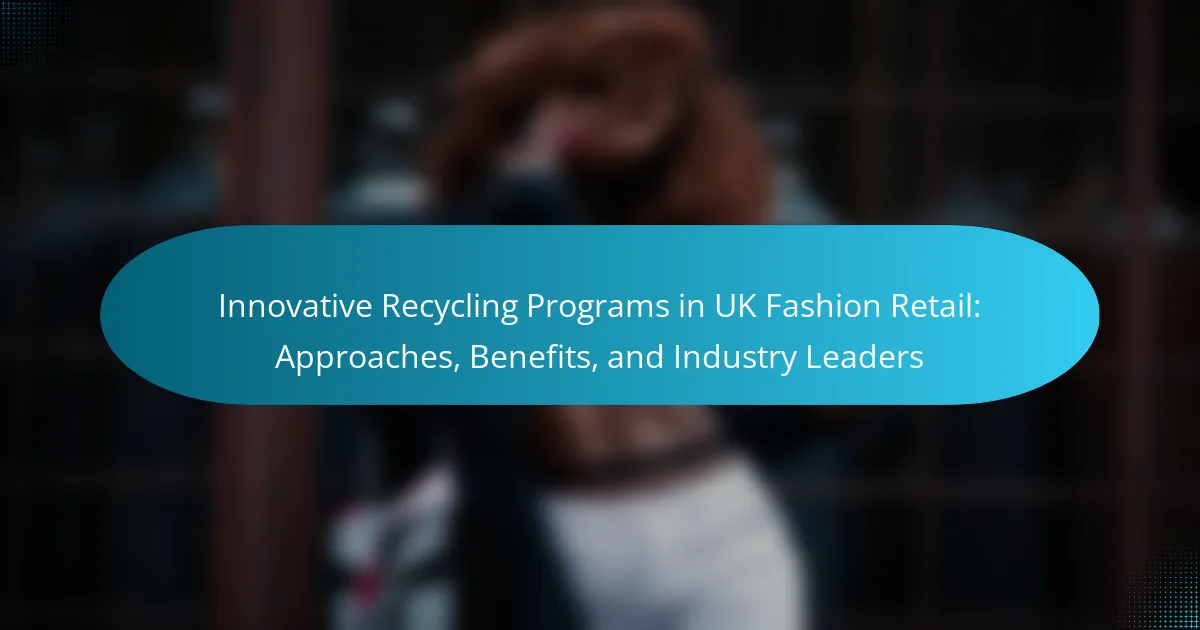
What is the role of ethical production in UK fashion retail?
Ethical production plays a crucial role in UK fashion retail by ensuring sustainable practices and fair labor conditions. It addresses environmental concerns by promoting eco-friendly materials and reducing waste. Ethical production also enhances brand reputation, attracting conscious consumers who prioritize responsible sourcing. According to a 2021 survey by Fashion Revolution, 70% of UK consumers consider ethical practices important when making purchasing decisions. Furthermore, it fosters transparency in supply chains, allowing consumers to make informed choices. This approach not only supports workers’ rights but also contributes to long-term industry sustainability.
Why is ethical production important in the fashion industry?
Ethical production is important in the fashion industry because it ensures fair labor practices and environmental sustainability. This approach protects workers’ rights and promotes safe working conditions. It also minimizes the industry’s ecological footprint by reducing waste and pollution. According to the Ethical Fashion Report, unethical practices can lead to exploitation and harm to vulnerable communities. Consumers increasingly demand transparency and accountability from brands. A 2021 survey found that 66% of global consumers are willing to pay more for sustainable brands. Therefore, ethical production is crucial for building consumer trust and loyalty in the fashion sector.
What are the key principles of ethical production?
The key principles of ethical production include fair labor practices, environmental sustainability, and transparency. Fair labor practices ensure that workers receive fair wages and safe working conditions. This principle promotes the well-being of employees and supports their rights. Environmental sustainability focuses on minimizing the ecological impact of production processes. This includes using eco-friendly materials and reducing waste. Transparency involves open communication about sourcing, production methods, and labor conditions. This principle builds trust between brands and consumers. These principles are essential for fostering responsible and sustainable fashion practices in the UK retail industry.
How does ethical production impact the environment?
Ethical production positively impacts the environment by promoting sustainable practices. It often reduces waste through efficient resource management. Ethical production frequently involves the use of eco-friendly materials. This minimizes harmful emissions associated with traditional manufacturing. Additionally, it encourages fair labor practices, which can lead to better community engagement in environmental initiatives. Research indicates that brands adopting ethical practices can reduce their carbon footprint by up to 30%. This shift not only benefits the planet but also enhances consumer trust and loyalty.
What standards govern ethical production in UK fashion retail?
The standards that govern ethical production in UK fashion retail include the Ethical Trading Initiative (ETI) Base Code, the Modern Slavery Act 2015, and various sustainability certifications. The ETI Base Code outlines key principles for fair labor practices, including no forced labor, no child labor, and safe working conditions. The Modern Slavery Act mandates transparency in supply chains and requires businesses to disclose efforts to combat slavery. Additionally, certifications like Fair Trade and GOTS (Global Organic Textile Standard) promote environmental sustainability and social responsibility. These standards aim to ensure that fashion retailers operate ethically and responsibly in their production processes.
What certifications are recognized for ethical fashion production?
Certifications recognized for ethical fashion production include Fair Trade, GOTS (Global Organic Textile Standard), and WRAP (Worldwide Responsible Accredited Production). Fair Trade ensures fair wages and safe working conditions for producers. GOTS certifies organic textiles and requires adherence to environmental and social criteria. WRAP focuses on safe, lawful, and ethical manufacturing practices. Other notable certifications are OEKO-TEX, which tests for harmful substances, and B Corporation, which assesses overall social and environmental performance. These certifications help consumers identify brands committed to ethical practices in fashion.
How do these standards influence consumer choices?
Ethical production standards significantly influence consumer choices by shaping perceptions of brand value and trust. Consumers are increasingly aware of environmental and social issues in fashion. Research shows that 66% of global consumers are willing to pay more for sustainable brands. Ethical standards signal transparency and responsibility in production processes. Brands adhering to these standards often attract loyal customers who prioritize sustainability. Additionally, negative publicity surrounding unethical practices can lead to consumer boycotts. Thus, adherence to ethical standards can enhance brand reputation and drive purchasing decisions.
What challenges does the UK fashion retail sector face in ethical production?
The UK fashion retail sector faces significant challenges in ethical production. Key issues include supply chain transparency, which is often lacking. Many brands struggle to trace the origins of their materials. This results in difficulties ensuring fair labor practices. Additionally, cost pressures can lead to compromises in ethical standards. Consumers increasingly demand sustainable practices, yet many retailers find it hard to balance cost and ethics. Regulatory compliance also poses a challenge, as laws evolve to address sustainability. Finally, the fast-paced nature of fashion complicates long-term ethical commitments. Collectively, these factors hinder the sector’s ability to adopt fully ethical production practices.
What are the common barriers to implementing ethical practices?
Common barriers to implementing ethical practices include lack of awareness, financial constraints, and resistance to change. Many businesses remain unaware of ethical standards and their importance. Financial limitations can hinder investment in sustainable materials and processes. Resistance from stakeholders can prevent the adoption of new practices. Additionally, complexity in supply chains makes monitoring ethical compliance challenging. According to a survey by the Ethical Trading Initiative, 60% of companies cite cost as a significant barrier. These factors collectively impede the shift towards ethical production in the UK fashion retail sector.
How do economic factors affect ethical production in fashion?
Economic factors significantly influence ethical production in fashion. These factors include production costs, consumer purchasing power, and market demand. High production costs often lead brands to prioritize cheaper manufacturing methods. This can result in unethical labor practices and environmental harm. Conversely, when consumers are willing to pay more, brands can invest in sustainable and ethical practices. For instance, a survey by McKinsey & Company found that 66% of consumers are willing to pay more for sustainable brands. Additionally, economic downturns can reduce demand for ethical products, leading brands to compromise on their ethical standards. Thus, economic conditions directly shape the feasibility of ethical production initiatives in the fashion industry.
How does consumer awareness influence ethical production in fashion?
Consumer awareness significantly influences ethical production in fashion by driving demand for sustainable practices. When consumers are informed about the environmental and social impacts of their purchases, they tend to prefer brands that prioritize ethical production. This shift in consumer behavior encourages brands to adopt more sustainable practices to maintain competitiveness. According to a 2021 survey by McKinsey, 67% of consumers consider sustainability when making a purchase. Brands that fail to meet these expectations risk losing market share. Additionally, increased awareness leads to greater scrutiny of supply chains, prompting brands to improve transparency. As a result, ethical production becomes a key differentiator in the fashion industry.
What role does consumer demand play in promoting ethical standards?
Consumer demand significantly influences the promotion of ethical standards in fashion retail. When consumers prioritize ethical products, brands respond by adopting higher standards. Research shows that 66% of global consumers are willing to pay more for sustainable brands. This demand creates a competitive market where ethical practices become essential for business success. Brands that fail to meet these standards risk losing market share. Consequently, consumer preferences drive companies to improve transparency and social responsibility. Ethical consumerism has been linked to increased sales for brands that demonstrate commitment to ethical practices. Thus, consumer demand acts as a catalyst for ethical advancements in the fashion industry.
How can consumers identify ethically produced fashion items?
Consumers can identify ethically produced fashion items by looking for specific certifications and labels. Certifications such as Fair Trade, GOTS (Global Organic Textile Standard), and OEKO-TEX indicate adherence to ethical production practices. These labels ensure fair wages, safe working conditions, and sustainable sourcing of materials. Additionally, consumers should research brands’ transparency regarding their supply chains. Brands that openly share information about their sourcing and manufacturing processes are often more reliable. Checking for sustainable materials like organic cotton or recycled fabrics is also essential. Ethical brands often promote their practices on their websites and social media. Engaging with customer reviews can provide insights into a brand’s ethical commitments. Lastly, attending ethical fashion events or markets can help consumers discover trustworthy brands.
What are the potential impacts of ethical production on the UK fashion retail market?
Ethical production can significantly impact the UK fashion retail market. It influences consumer purchasing decisions, as more shoppers prefer brands with sustainable practices. A report by the Ethical Consumer indicates that 63% of UK consumers consider ethical production important when buying clothing. Additionally, ethical production can enhance brand reputation and customer loyalty. Brands that adopt ethical practices often see an increase in sales and market share. Furthermore, ethical production may lead to higher operational costs initially, but it can reduce long-term risks associated with labor violations and environmental damage. The shift towards ethical production is reshaping supply chains and encouraging transparency in the fashion industry.
How does ethical production affect brand loyalty and reputation?
Ethical production significantly enhances brand loyalty and reputation. Consumers increasingly prefer brands that demonstrate social responsibility and ethical practices. A survey by Nielsen found that 66% of global consumers are willing to pay more for sustainable brands. This preference leads to stronger emotional connections with brands. Ethical production also mitigates negative publicity associated with labor exploitation and environmental harm. Brands that prioritize ethical practices often enjoy higher customer retention rates. For instance, Patagonia has built a loyal customer base by committing to environmental sustainability. This loyalty translates into positive word-of-mouth and brand advocacy. Overall, ethical production fosters trust and credibility, essential components for long-term brand success.
What are the long-term benefits of ethical production for retailers?
Ethical production offers long-term benefits for retailers, including enhanced brand loyalty and reputation. Consumers increasingly prefer brands that demonstrate social responsibility. According to a 2020 study by Nielsen, 66% of global consumers are willing to pay more for sustainable brands. Ethical practices can lead to reduced operational risks and supply chain disruptions. Retailers adopting ethical production often experience lower employee turnover rates. This results in cost savings and improved productivity. Additionally, ethical production can open new markets and customer segments. Retailers can leverage this to drive sales growth over time. Overall, ethical production creates a sustainable competitive advantage in the retail sector.
What practical steps can consumers take to support ethical fashion production?
Consumers can support ethical fashion production by choosing brands that prioritize sustainability and fair labor practices. Research shows that 66% of global consumers are willing to pay more for sustainable brands. Shoppers should look for certifications like Fair Trade or GOTS. They can also buy second-hand clothing to reduce waste. Supporting local artisans and small businesses helps promote ethical practices. Consumers should educate themselves about the supply chains of their favorite brands. Engaging in advocacy for stronger regulations in the fashion industry can also drive change. Lastly, sharing knowledge about ethical fashion with others raises awareness and encourages collective action.
The main entity of the article is ethical production in UK fashion retail. The article provides a comprehensive overview of the significance of ethical production, focusing on its role in promoting sustainable practices, fair labor conditions, and transparency within supply chains. Key principles, standards, and recognized certifications that govern ethical production are outlined, alongside the challenges faced by the industry, such as supply chain transparency and economic factors. Additionally, the article explores the influence of consumer awareness and demand on ethical practices, highlighting the long-term benefits for brands that adopt these standards. Practical steps for consumers to support ethical fashion production are also discussed, emphasizing the collective impact on the industry.



